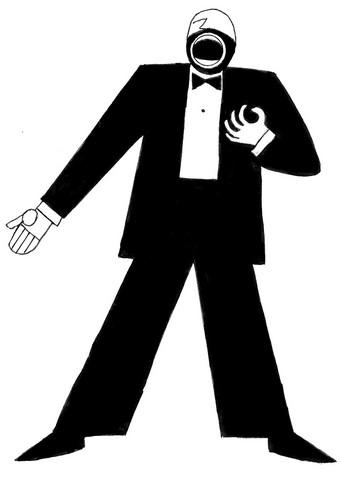I Love You Porgy?
One of the lovely perks of singing with the Opera Company of Philadelphia is getting free tickets to dress rehearsals of shows. This week I took in OCP's production of 'Porgy and Bess' opening this week. Since I am affiliated with OCP I figured it's best not to talk too much about the actual performances or the production (which for the most part I liked) but rather talk about the show.
This was my first 'Porgy' experience. Granted, I know all of the "hits" (can you think of any other opera which has had at least five songs that have infiltrated the ranks of pop?) but I had never sat down before to listen to the whole thing. Now I know why: 'Porgy' is a problematic show with as many musical gems as there are moments of musical and dramatic stagnation. The overall impression I took from the show was that of a flashy composer with some brilliant ideas who is attempting to do too much. I am not the first person to accuse Gershwin of this. I was impressed by how well Gershwin absorbed all of the music of the South, from the many church-like scenes to the occasional snatches of hawker's and boatmen songs. It's kind of nice to see a show with so many comprimario roles. However, his attempt to capture everything partially contributes to the show's weaknesses; it occasionally comes across like musicological research rather than a cohesive music drama. I've been thinking a lot about Puccini's "atmospheric" music in 'Tosca' and in particular the shepherd boy's song before the final act. In the context of the drama, at dawn before Cavaradossi is about to be executed, the simplicity and purity of the boy's voice is haunting in juxtaposition to the violence that has come before and will come after. As an audience we need this (false) sense of calm in order for the final act to have dramatic punch. Compare this to Gershwin's use of the crab-man's song in Act II of 'Porgy' - the drama literally just stops for no reason. The song provides atmosphere, but 'Porgy' is so full of atmosphere anyway that it's superfluous. This is a common problem in 'Porgy'. We are not propelled from scene to scene and there are very slow stretches in the score. I also got a bit sick of Gershwin's palette and wished he could have "dirtied" up the score a bit with strident harmony or deft orchestration. Britten does this very successfully in 'Peter Grimes', another 20th-century small-town sea-village opera. Of course, I'm a bit biased towards Britten anyway, but he is also much more adept at building drama. It's interesting to note that Britten mentioned 'Porgy' as one of the many influences on 'Grimes'.
I guess I should try to remember that 'Porgy' was Gershwin's first and only opera. He probably would have grown as an opera composer had he attempted another one. 'Porgy' is important in American musical history for its attempt to fuse the vernacular and the academic. It's also pretty potent socially as well, tackling subjects like racism, classism, drug-addiction, religion and sex. It doesn't quite reach the level Gershwin wanted it to, but it's a noble effort.


0 Comments:
Post a Comment
<< Home